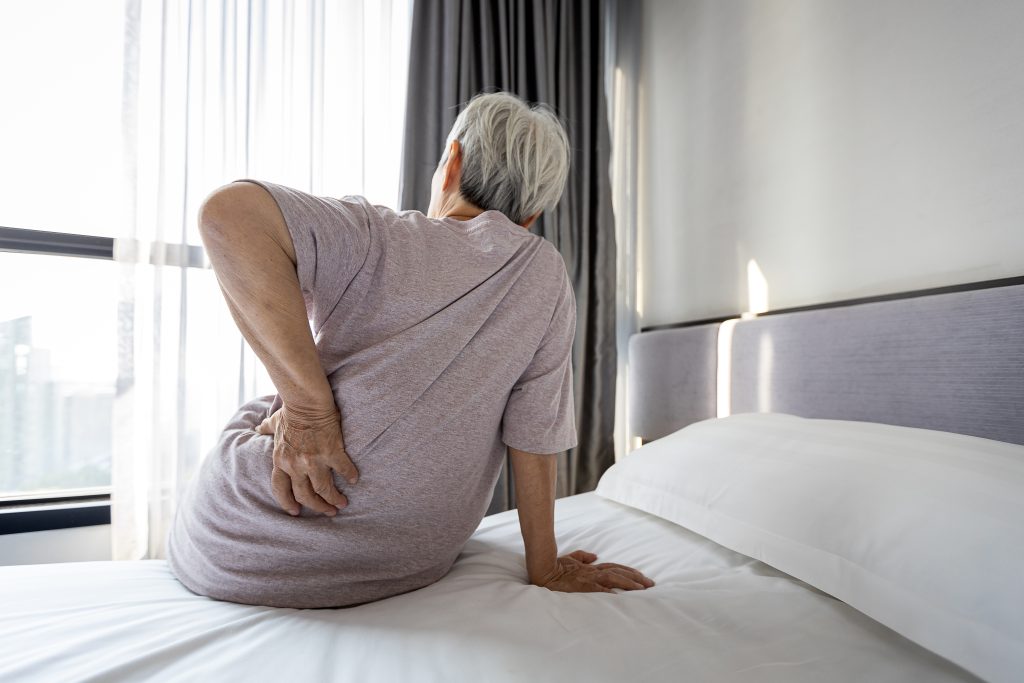Waking up with nagging hip pain can put a damper on your entire day. For side sleepers, hip and low back pain might be all too familiar. While side-sleeping can be a comfortable and even recommended position for some, it can also sometimes lead to hip pain or exacerbate injuries or other pre-existing conditions.
Understanding the root cause of your hip pain and making a few adjustments can make a significant difference not only to your sleep quality but also to your overall well-being.
What causes hip pain after sleeping?
Hip pain after an otherwise normal night of sleep can stem from a variety of underlying causes. Your sleeping position, existing medical conditions, and even your mattress could be playing a role. Let’s break down some of the common culprits behind hip pain when sleeping on your side.
Poor sleeping position
Side sleeping can sometimes put excessive pressure on the hip that’s in direct contact with your mattress during the night. Over time, this pressure can cause discomfort and inflammation in the surrounding muscles and connective tissue. Additionally, sleeping in a cramped or twisted posture—which you may not be aware of—can strain the hip joint and lead to pain by morning.
Hip osteoarthritis
If you suffer from hip osteoarthritis, sleeping on your side can aggravate the condition. Osteoarthritis causes the cartilage cushioning the hip joint to wear down, leading to bone-on-bone contact, stiffness, and pain. Applying pressure to the affected joint while side-sleeping can intensify symptoms when you wake up.
Hip bursitis
Hip bursitis occurs when the fluid-filled sacs (called bursae) that cushion your hip joints become inflamed. Lying on an inflamed hip for hours while sleeping on your side can increase soreness when you wake, and might also make it difficult to find a comfortable position to fall asleep in.
Sacroiliac joint dysfunction
The sacroiliac joint connects your lower spine to your pelvis. Dysfunction in this central load-bearing joint, often caused by injury or repetitive stress, can lead to referred pain in the hip area. Poor sleep posture on your side might worsen this discomfort, making mornings particularly challenging.
How to relieve hip pain while you sleep
The good news is that with a few purposeful adjustments, you can reduce hip pain from sleeping on your side. From addressing your sleep environment to treating the underlying issues, here are some actionable steps to help you rest easier.
Change your sleep position or environment
- Sleep on your back: While not everyone finds back-sleeping comfortable, it’s often the best position for reducing pressure on your hips. Placing a small pillow under your knees can further help with proper spinal alignment and reduce tension in your lower body.
- Add a pillow between your knees: If you’re committed to sleeping on your side, try placing a pillow between your knees to keep your hips and spine aligned. This simple change minimizes the strain on your hip joint.
- Check your mattress: A mattress that is too firm might increase pressure on sensitive hips, while one that’s too soft can fail to provide needed support. Consider using a medium-firm mattress or adding a mattress topper to better cushion your hips.
- Replace your pillow: Your neck alignment plays a crucial role in how your whole body feels during sleep. Ensure your pillow adequately supports your neck and keeps your spine in a neutral position.
Stretch before bed
It might seem silly, but performing gentle stretches before bedtime can loosen tight muscles and support better hip alignment while you sleep. Focus on hip flexor stretches, gentle yoga positions like child’s pose, or figure-four stretches to relieve tension.
Seek personalized treatments for your hip condition
If simple adjustments don’t relieve your hip pain consistently or effectively, it may be time to explore professional treatments. Physical therapy is an excellent option for addressing hip pain without invasive procedures.
One of Rehab Access’s physical therapists can assess your concerns, provide specialized evaluations for posture, ergonomics, or even sleeping position, and develop a personalized plan to reduce your pain through natural stretching and strengthening techniques. Not only can this help relieve pain, but it can also prevent future discomfort, ensuring that your lifestyle and sleep quality remain uninterrupted.
Hip pain treatment in New Orleans
If you’re struggling with hip pain after sleeping and haven’t found lasting relief, the team at Rehab Access Physical Therapy is here to help. Our experienced therapists work with you to identify the root cause of your pain and create an individualized treatment plan that aligns with your needs and goals.
Learn more about how we might help you sleep better and wake up with less pain by calling one of our clinics or by requesting your appointment online today.
